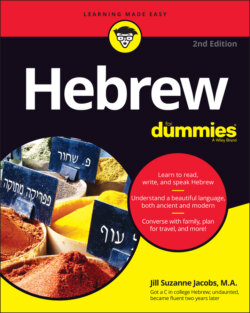Читать книгу Hebrew For Dummies - Jill Suzanne Jacobs - Страница 21
Counting objects
ОглавлениеThe gender of the number you use when you want to count something depends on the gender of the noun you’re counting. (Sound confusing? Don’t worry. You can do it.) Counting objects in Hebrew is easy. Just remember to do the following things:
Figure out the gender of the noun you’re counting. If you want to talk about one book, first you must figure out whether the noun book is masculine or feminine. (It’s masculine.) So, when you count books, you need to use the masculine form of the number.
Place the number appropriately before or after the noun. For the number 1, you place the number after the noun. So rather than saying “one book,” you say, “book one” (סֵפֶר אֶחָד; seh-fehr eh-chad). But after you get to the number two, place the number before the noun. In Hebrew, the plural of סֵפֶר is סְפָרִים (sfah-reem; books). So, to say “two books,” you say שְׁנֵי סְפָרִים (shnay sfah-reem); for “three books,” say שְׁלוֹשָׁה סְפָרִים (shloh-shah sfah-reem); for “four books,” say אַרְבָּעָה סְפָרִים (ahr-bah-ah sfah-reem); and so on.
The number 2 in Hebrew is an exception. When you’re specifying two of something, say “two boys” (יְלָדִים; yuh-lah-deem) or “two girls” (יְלָדוֹת; yuh-lah-doht), and drop the last syllable (im) of the number 2. So, you get יְלָדִים (two boys) and שְׁתֵּי יְלָדוֹת (two girls). Drop the im regardless of the noun you’re counting.
